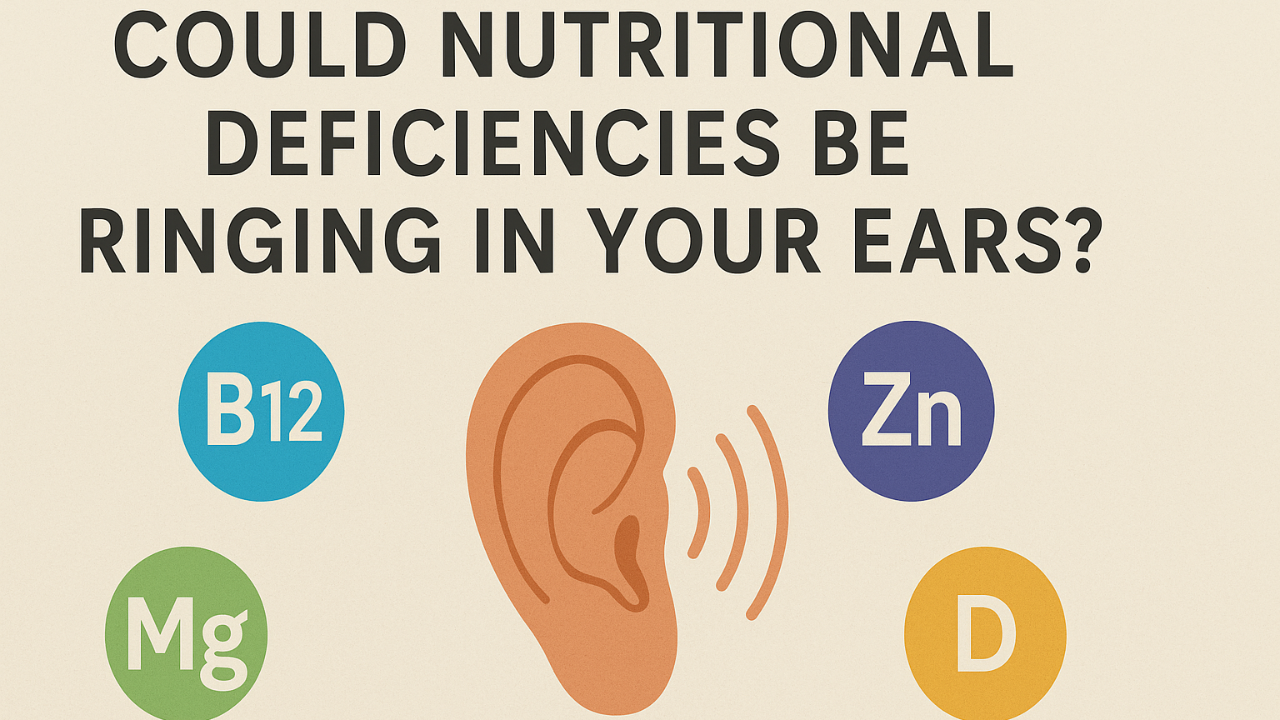What’s That Ringing? Natural Approaches to Tinnitus in Midlife

Part 1: Could Nutritional Deficiencies Be Ringing in Your Ears?
One of the most-read blogs on my entire site is “Menopause and Ear Health”. I’ve received countless messages from women relieved to finally find a discussion that connects the dots between hormones and hearing, particularly that persistent, irritating ringing in the ears known as tinnitus.
Clearly, this is an issue that’s affecting many midlife women. So I wanted to dig a little deeper and explore another piece of the puzzle: nutritional deficiencies that may contribute to or worsen tinnitus.
What Is Tinnitus?
Tinnitus is commonly described as a ringing, buzzing, hissing, or pulsing sound in one or both ears—when no external sound is actually present. It can be occasional or constant, and for some women, it significantly impacts quality of life, contributing to poor sleep, anxiety, and even cognitive fatigue.
While hormonal changes in menopause certainly play a role, nutritional imbalances are an often-overlooked trigger—and one that can be addressed naturally.
Nutritional Deficiencies Linked to Tinnitus
Let’s take a closer look at some of the most common nutrients linked with tinnitus and how they affect your auditory system:
Vitamin B12 – Fuel for Your Nerves
Vitamin B12 is vital for maintaining the protective myelin sheath around nerves, including the auditory nerve. A deficiency may lead to nerve dysfunction and impaired signal transmission, contributing to tinnitus or hearing loss.
Risk factors for deficiency:
-
Vegetarian or vegan diet
-
Long-term use of antacids or metformin
-
Pernicious anaemia or poor gut absorption
Functional testing can assess serum B12, methylmalonic acid, and homocysteine for a more complete picture.
Magnesium – Nature’s Nervous System Soother
Magnesium helps regulate nerve signalling and protects the inner ear against excessive glutamate activity (a neurotransmitter involved in excitotoxicity). It's also known to help reduce the risk of noise-induced hearing damage.
Low magnesium may result in:
-
Increased auditory nerve sensitivity
-
Heightened stress reactivity (which often worsens tinnitus)
Great food sources include leafy greens, nuts, seeds, and dark chocolate, but therapeutic doses may require supplementation.
Zinc – Cellular Repair and Inner Ear Function
Zinc is required for cochlear health, immune function, and cellular repair. The highest amounts of zinc are actually found in your ears! Deficiency has been observed in many tinnitus sufferers, and in some cases, zinc supplementation has led to symptom improvement.
Risk factors:
-
Chronic stress (which depletes zinc)
-
Poor diet
-
High copper levels (which antagonise zinc)
Zinc is especially important if your tinnitus is accompanied by low immunity, poor wound healing, or frequent infections.
Iron – More Than Just Energy
While many women associate iron with fatigue, low levels can also affect oxygen transport to the auditory system. Iron-deficiency anaemia may impair blood flow to the inner ear, leading to tinnitus symptoms.
Symptoms of low iron/ferritin:
-
Fatigue
-
Pale skin
-
Dizziness
-
Hair loss
-
Tinnitus or muffled hearing
This is particularly relevant in perimenopausal women with heavy periods, fibroids, or digestive absorption issues.
Vitamin D – For Bones, Ears, and Beyond
Vitamin D supports calcium balance in the inner ear and helps modulate inflammation. Deficiency may impact cochlear function, especially in women with concurrent bone loss or metabolic inflammation.
Vitamin D and magnesium also work synergistically, so it's worth checking both if you have persistent tinnitus or any other menopausal symptoms.
Other Nutrients to Consider
-
Vitamin A – Supports the epithelial lining of the inner ear.
-
Vitamin E – Helps combat oxidative stress in auditory pathways.
-
Folate (B9) – Aids blood flow and neurotransmitter synthesis.
-
CoQ10 – Enhances mitochondrial energy production; useful in noise-induced or metabolic tinnitus.
Why This Matters in Menopause
During the menopause transition, your body undergoes massive changes in hormones, metabolism, and nutrient absorption. Stress levels increase, digestion may slow, and sleep disturbances rise, all of which can deplete your nutrient reserves.
Tinnitus, then, may not just be a random nuisance. It could be a red flag that your nervous system and cellular health are calling out for support.
Getting to the Root Cause
If you’re experiencing tinnitus alongside fatigue, brain fog, mood swings, or poor sleep—it may be time to dig deeper. At Menopause Natural Solutions, I take a functional medicine approach to uncover the root causes of your symptoms.
We start with targeted testing, including nutrient status, toxicity levels, and mitochondrial health markers and build a personalised roadmap to restore balance.
Ready to Turn Down the Ringing?
You don’t have to live with tinnitus, or guess your way through supplements.
📞 Book a menopause strategy call to find out how we can work together to support your ears, your energy, and your entire midlife transition, naturally.


